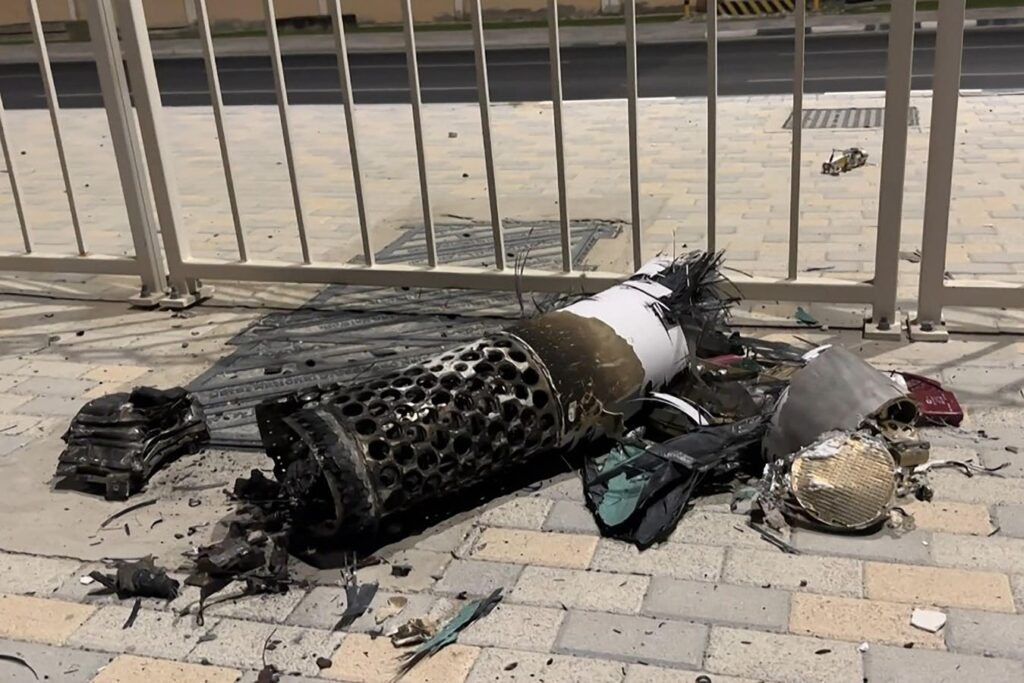This frame grab take from AFPTV footage shows the remnants of an Iranian missile intercepted over … More
The military actions of the U.S. in Iran will have domestic economic implications. The early reactions have already begun. Oil prices jumped by a few percent in the immediate response, but the question now is what happens with the economy?
Energy Prices
Multiple market experts say that the initial oil price jump was to be expected. Brent oil closed on Friday at $77.01 a barrel. It opened on Monday, June 23, at $80.29. By midday, it was down to roughly $75. This is significantly up from a recent low of $62, however, over the last few years such prices haven’t been unusual.
Similarly, West Texas Intermediate closed last Friday at $73.84 and opened today at $77.96. At midday, it was under $70. Similarly, a price of $70.07, the low for Monday, is an average of the 52-week high and low.
However, these are the immediate responses. Many scenarios could potentially play out, altering everything.
Iran Reactions
“Oil prices can go up if Iran retaliates by hitting neighboring oil lines,” says Babak Hafezi, an adjunct professor of international business at American University. “The Middle East produces an estimated 30.7 million barrels a day. If Iran bombs pipelines, we could see oil at $150 [a barrel]
for 6 to 12 months and major economic dislodgment globally.”
Iran has already stuck a U.S. Air Force base in Qatar, although the “Qatari Minister of Foreign Affairs said in a statement that Qatari air defenses ‘thwarted the attack and successfully intercepted the Iranian missiles,’” as The Hill reported.
According to USA Today, Iran’s parliament endorsed closing the Strait of Hormuz, a major transportation route. There’s speculation about what this might mean to global trade and oil transport.
“Most of the commentary on the Strait of Hormuz being closed by Iran is a gross overestimation of Iranian capabilities,” says John Berman, chief investment officer of Berman Capital Group, an investment management company focusing on energy, minerals, infrastructure, and shipping. “Iran currently cannot even come close to defending its own airspace, and yet people think that Iran will be able to close off ship traffic to a 21-mile — at its narrowest point — strait that is as economically vital as the Strait of Hormuz, not to mention the US 5th Fleet stationed in Bahrain.”
Berman continued to say that Iran could disrupt some shipping, increasing the cost of crude oil because of increased insurance costs. But the country likely understands that attempts at a blockade “would require a large-scale military response from the United States, for which Iran has absolutely no means of defending against.” Iran’s Kharg Island export terminal, its largest source of funding through shipping oil, would likely become a bombing target as a result.
Impact On Other Investments
Another question is what the impact might be on investments. Remembering again that events are early on. The yield of the 10-year Treasury Note, an important component of how long-term interest rates are set, is at a low since early May. The 2-year Treasury Note’s yield is also at a low since early May. When yields fall, prices are up inversely, suggesting that investors are shifting money into U.S. government bonds as a safe haven.
The S&P 500, Dow Jones Industrial Average, Nasdaq, and Russell 2000 are all up over Friday. The VIX volatility index is down. Markets are stable.
None of this eliminates the potential problems resulting from U.S. military intervention, classically creating a state of war. But for now, at least, the financial underpinnings of the U.S. economy haven’t suffered damage.
Read the full article here
